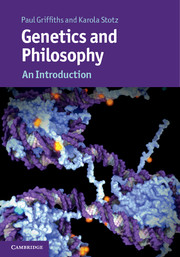7 - The behavioural gene
Published online by Cambridge University Press: 05 April 2013
Summary
Behaviour genetics
In this chapter we introduce the traditional, quantitative approach to understanding the role of genes and environment in behaviour and behavioural difference, and contrast it to the causal analysis of the interaction of genes and environment recommended by critics of traditional behaviour genetics, especially Gilbert Gottlieb.
We show that there are two very different ways in which responsibility for a behavioural difference can be sheeted home to a genetic difference. These involve two identities of the gene: the familiar Mendelian allele and another identity which we call the ‘abstract developmental gene’. Using these different identities of the gene, and the conceptions of gene action which accompany them, we can throw light on some of the disputes between behaviour geneticists and their critics.
In the final section of the chapter we suggest that the abstract developmental gene is now becoming concrete, as particular sequences of DNA. Behaviour genetics has also started to locate the basis of the statistical component of genetic variance in DNA sequences. The result is a convergence of the role of genes in both approaches. This explanatory role for genes resembles that of the earlier, abstract developmental gene. It is a contextual, systems-style form of genetic explanation and constitutes a corrective to the idea of bio- logical explanation as the identification of specific actual difference makers advocated by Waters (2007) (see 4.3).
- Type
- Chapter
- Information
- Genetics and PhilosophyAn Introduction, pp. 181 - 200Publisher: Cambridge University PressPrint publication year: 2013



